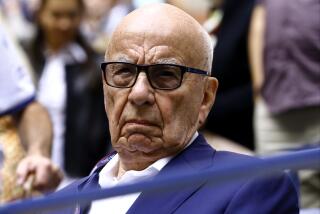Satellite TV Company in U.K. Faces Hurdles : Television: The newly merged British Sky Broadcasting needs 2 million subscribers to break even.
- Share via
LONDON — Satellite television stands a better chance of success in Britain now that its two rival companies have merged, but experts say the new British Sky Broadcasting faces a costly battle to become profitable.
By agreeing to merge late last year, Rupert Murdoch’s Sky Television and investor-owned British Satellite Broadcasting Ltd., or BSB, will eliminate expensive competitive advertising and other overhead costs while sharing access to 1.8 million British homes.
“There were not enough subscribers coming forward to support both channels,” said Derek Brock, an analyst with Nomura Research Institute. “A lot of the resistance to satellite television in the U.K. was because there was a considerable amount of confusion about just what was being offered.
“But now that they are faced with a single option, I think you will see a much faster take up.”
The merged company still faces many hurdles, including an ongoing recession and shrinking advertising expenditure. Total British ad spending fell 8% to $2.3 billion in the fourth quarter of 1990 from a year earlier, according to the Advertising Assn.
And British TV audiences have fallen. The number of hours of regular television Britons watch a day fell to 3 1/2 hours in November from nearly four hours five years ago, according to the research company AGB Television.
Satellite television accounted for 35% of total TV viewership around the time of the merger agreement two months ago, said RSMB TV Research.
Combining the two satellite television operations won’t come cheap, either. Converting the incompatible BSB satellite dishes alone could cost $76 million, said Terry Povey, an analyst with ANZ McCaughan Securities.
The merged company’s strategy is to build a subscription base whose fees would cover the operating costs and would be large enough to command significant ad rates above that, Povey said.
He said the company needs 2 million full-paying movie-channel subscribers to break even, and the sign-up rate has slowed.
“The reported profit picture is going to be murky at best,” he said.
Sky, which was launched in February, 1989, and BSB, which began operating in April, said they merged a combined investment of $2.4 billion.
Consumers pay about $570 for the dish and receiver, about $133 for installation, and about $19 a month for a subscription movie channel.
Sky says more than a million of its dishes are in use in Britain’s 22 million homes. Another 600,000 receive Sky by cable.
Britain has four land-based channels. BBC1 and BBC2 are operated by state-supported British Broadcasting Corp. and are partly funded by an annual fee paid by viewers. The other two channels are independent and commercial.
Channel 5, the new land-based commercial channel, probably will begin broadcasting in the mid-1990s.
Before the merger, Sky Television had four channels, and BSB had five.
What are left today are: Sky’s four--a 24-hour news channel that is a less-ambitious version of Cable News Network, a sports channel, a general entertainment channel, and a subscription movie channel--plus a BSB subscription movie channel.
Many critics have opposed the creation of a satellite television monopoly, while others have argued against giving Murdoch more control over British TV and newspapers.
Michael Grade, chief executive of Channel 4, wrote in an article in the Evening Standard, “Of course monopolies are always cheaper than competition. It is cheaper to run five channels without the costs of competition than nine channels with them. And the new company certainly has got a monopoly.”
Grade urged, “Let’s have more competition, but let’s make it fair, and let’s make sure it means more real choice for the British viewer.”
The deal was cleared by the government in December.
The merged company also has been attacked for its decision to go with the inferior Sky technology, and for the domination of Sky’s more commercial programming on the merged channels.
BSB’s “programs were certainly closer to the British public service tradition than to the distinctly commercial Australian-American formula used by Sky,” wrote Chris Dunkley, the Financial Times’ television writer.
The merged company will use Sky’s Astra satellite after a two-year transition period during which both satellites will be used.
By operating through the Luxembourg consortium Astra, Murdoch was able to become exempt from the Broadcasting Act, which prohibits owners of national newspapers from owning more than 20% of a TV company.
Murdoch owns five British newspapers, which command more than a third of Britain’s daily and Sunday circulation.
BSB got access to a different satellite by winning a 15-year government contract to use the channels that were allocated to Britain under an international treaty.
The government is free to reallocate the channels to a new competitor if British Sky Broadcasting is given three months’ notice.
More to Read
The biggest entertainment stories
Get our big stories about Hollywood, film, television, music, arts, culture and more right in your inbox as soon as they publish.
You may occasionally receive promotional content from the Los Angeles Times.










